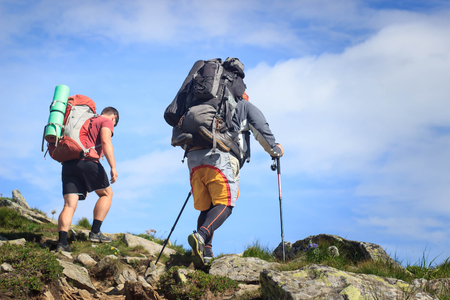1. Understanding Mental Resilience in the Great British Outdoors
When we think of hiking across the UK—whether it’s rambling through the lush valleys of the Lake District, braving windswept peaks in Snowdonia, or trekking the wild and remote Scottish Highlands—it’s easy to focus on physical fitness and sturdy boots. But ask any seasoned hillwalker, and they’ll tell you that mental resilience is just as crucial for extended hiking adventures. In the British outdoors, mental resilience means more than simply “toughing it out”; it’s about adapting to unpredictable weather, navigating challenging terrain, and keeping spirits high even when the rain pours down for the third day in a row. It’s having the mindset to keep going when your legs are tired and your waterproofs are drenched, drawing on inner strength to appreciate the beauty around you despite any discomforts. For families and individuals alike, building this kind of resilience transforms a tough hike into a memorable adventure—where every challenge becomes part of the story you’ll share over a hot cuppa at journey’s end.
Common Psychological Challenges on UK Trails
When embarking on an extended hiking adventure across the UK’s diverse landscapes, walkers often face more than just physical challenges. The psychological hurdles can be just as demanding, and understanding them is key to building mental resilience. Let’s explore some of the most common mental obstacles British hikers encounter, so you can prepare yourself and your family for a rewarding journey.
Unpredictable Weather
The British weather is famously changeable. One minute you’re basking in sunshine across the South Downs; the next, you’re caught in a sudden downpour in the Lake District. Such fluctuations can dampen spirits and test your resolve. It’s not just about staying dry – persistent grey skies or gusty winds can wear away at motivation and morale, especially over multiple days on the trail.
Isolation and Loneliness
Many of the UK’s most breathtaking trails, such as sections of the Pennine Way or remote stretches of Scotland’s West Highland Way, wind through areas with little human contact. While solitude can be peaceful, it can also trigger feelings of isolation or anxiety, particularly for those hiking alone or for families unused to being away from urban comforts. Even in a group, long stretches without meeting other hikers might bring about unease or doubt.
Physical Fatigue and Its Mental Impact
Endurance walks like the Coast to Coast Path or multi-day routes in Snowdonia demand sustained effort. As fatigue builds, so too does self-doubt and irritability. Physical tiredness often leads to mental weariness: small setbacks feel bigger, and decision-making becomes harder. Recognising this link is vital for hikers of all ages.
Summary of Typical Mental Hurdles
| Mental Challenge | UK Trail Example | Potential Impact |
|---|---|---|
| Unpredictable Weather | Lakes & Peaks (Lake District, Peak District) | Lowered morale, frustration, worry about safety |
| Isolation | Pennine Way, Scottish Highlands | Anxiety, loneliness, reduced confidence |
| Physical Fatigue | Coast to Coast Path, South West Coast Path | Irritability, decreased motivation, poor judgement |
Coping Together as a Family
If you’re hiking with children or elderly relatives, these psychological challenges can feel even more pronounced. Open communication about everyone’s feelings, regular check-ins during rest stops, and celebrating small achievements together can help keep spirits high and ensure each family member feels supported throughout your UK hiking adventure.
![]()
3. Cultural Traditions and Community Spirit on the Path
One of the most delightful aspects of hiking across the UK is immersing yourself in the warmth of local traditions and community spirit. When tackling long-distance trails, mental resilience is often tested by unpredictable weather, tough terrain, or simple fatigue. Yet, there’s something uniquely uplifting about pausing for a traditional cuppa with fellow walkers or finding refuge in a cosy village pub after a challenging stretch.
Sharing a pot of tea might seem like a small gesture, but it’s a cherished British custom that brings hikers together, creating a sense of camaraderie even among strangers. These little moments of connection can work wonders for morale—especially when spirits are flagging. Likewise, the inviting atmosphere of a rural pub offers not just hearty food and shelter from the elements, but also laughter, conversation, and encouragement from locals who understand the trials of the trail.
Embracing these cultural rituals allows you to draw strength from others and feel part of something bigger than your own journey. Whether you’re swapping stories over a pint or receiving directions from friendly villagers, these experiences nurture emotional wellbeing and help build the inner fortitude needed to see your adventure through to the end.
4. Mindfulness and Wellbeing in Nature
Exploring the British countryside isn’t just a physical adventure; it’s a wonderful opportunity to nurture your mental wellbeing. Practising mindfulness while hiking allows you to fully immerse yourself in the present moment, appreciating every rolling hill, chirping bird, and gentle breeze. Here are some practical, UK-friendly mindfulness techniques to help you stay grounded and positive as you journey through Britain’s stunning landscapes:
Simple Mindfulness Practices for Hikers
| Technique | How to Practise | Benefits |
|---|---|---|
| The Five Senses Exercise | Pause and notice something you can see, hear, feel, smell, and taste. Take a moment at a viewpoint or along a woodland path. | Enhances presence and appreciation of your surroundings, making memories more vivid. |
| Breath Awareness | Focus on your breath as you walk—inhale for four steps, exhale for four steps. Try this as you climb a peak or cross a moor. | Calms nerves and helps manage fatigue during long stretches. |
| Gratitude Reflection | At the end of each day, reflect on three things you enjoyed about your walk—perhaps a friendly encounter or breathtaking view. | Lifts mood and builds positive associations with your hiking experience. |
The Power of Being Present in the British Outdoors
Britain’s diverse trails—from the rugged Scottish Highlands to the tranquil South Downs—provide endless opportunities for mindful exploration. Rather than rushing to tick off miles, take time to soak up the local atmosphere: listen to birdsong on Exmoor, savour the scent of wildflowers in the Lake District, or simply notice the changing weather rolling over the Yorkshire Dales. Each moment spent truly present strengthens your mental resilience and deepens your connection with nature.
Tuning into Local Traditions
You might also try embracing local customs along your route, such as stopping for a flask of tea on a drystone wall or chatting with fellow ramblers at a village pub. These small acts of connection not only ground you in the here and now but foster a sense of belonging and community—the very heart of British outdoor culture.
Tip for Families: Make Mindfulness Fun!
If you’re hiking with children, turn mindfulness into a game—who can spot the most unusual cloud shape or identify different bird calls? This makes the practice enjoyable for everyone and encourages young ones to develop their own resilience through nature.
5. Building a Supportive Hiking Network
One of the true joys of hiking across the UK is the sense of community that flourishes along its footpaths, moorlands, and hills. Cultivating a strong support network is not only beneficial for your practical needs but can also significantly boost your mental resilience during extended hiking adventures.
Connecting with Fellow Walkers
When you’re out on the trail, don’t hesitate to strike up conversations with fellow walkers. Whether you’re pausing at a trig point or sharing a cuppa in a bothy, these small exchanges often lead to meaningful connections. British hikers are renowned for their friendliness and willingness to share advice or lend a helping hand, so embrace these opportunities for camaraderie.
Joining Rambling Clubs
The UK has a proud tradition of rambling clubs, from local groups to national organisations like The Ramblers. Joining such a club provides access to group walks, social events, and shared knowledge about routes and gear. These clubs foster a sense of belonging and accountability—knowing you’ll see familiar faces each weekend can motivate you to keep going, even when the weather’s less than ideal.
The Power of Trail Camaraderie
There’s something special about the unspoken bond between walkers braving the same blustery fells or muddy lanes. Supporting one another through challenging stretches—be it with encouraging words, sharing snacks, or simply walking in companionable silence—can make all the difference to your state of mind. Don’t be afraid to lean on this natural fellowship; it’s part of what makes hiking in Britain so rewarding.
By actively building relationships within the UK hiking community, you’ll create a network that uplifts and inspires you. This collective spirit can become a cornerstone of your mental resilience, helping you face whatever challenges the trails may present.
6. Preparation Strategies for a Positive Trekking Experience
Preparing for a long-distance trek across the UK’s beautiful landscapes is about much more than just packing your rucksack. Whether you’re adventuring solo or as a family, thoughtful planning and self-care can make all the difference to your mental resilience and enjoyment. Here are some practical tips to help ensure your hiking experience is both positive and rewarding.
Plan Your Route with Flexibility in Mind
Start by choosing a route that suits everyone’s fitness levels and interests. The UK is blessed with well-marked trails like the South West Coast Path or Hadrian’s Wall, but it’s wise to have alternative routes or rest stops mapped out, especially if you’re trekking with children or beginners. Allow room for spontaneous detours—sometimes the unplanned moments become the most memorable.
Pace Yourself for Enjoyment, Not Just Achievement
It’s easy to get caught up in ticking off miles, but maintaining a comfortable pace helps prevent fatigue and keeps spirits high. Schedule regular breaks to enjoy a flask of tea, admire the views, or play a quick family game. Remember, it’s not just about reaching the destination—it’s about enjoying the journey together.
Prioritise Self-Care Before and During Your Hike
Looking after yourself starts before you even lace up your boots. Make sure everyone gets plenty of rest in the days leading up to your adventure. On the trail, listen to your body: stay hydrated, snack on energy-boosting foods, and don’t ignore niggles or blisters—address them early. Bring along familiar comforts like favourite snacks or a cherished teddy for younger trekkers to provide emotional reassurance.
Stay Connected and Communicate Openly
If you’re hiking as a group or family, check in regularly with each other about how everyone is feeling—physically and emotionally. Encourage honest conversations so small worries don’t become big ones. Sharing responsibilities, like navigating or carrying supplies, also helps everyone feel involved and valued.
Embrace Challenges as Opportunities
No trek is without its tough moments—be it bad weather, tired legs, or unexpected detours. Remind yourself and your group that overcoming these hurdles together builds confidence and strengthens bonds. Celebrate small victories along the way: reaching a tricky summit, spotting wildlife, or simply making it through a rainy patch with good humour.
By approaching your hike with careful planning, kindness towards yourself and others, and an open mind, you’ll be well equipped to build mental resilience on the trails. Most importantly, you’ll create memories that last long after you’ve hung up your walking boots.


